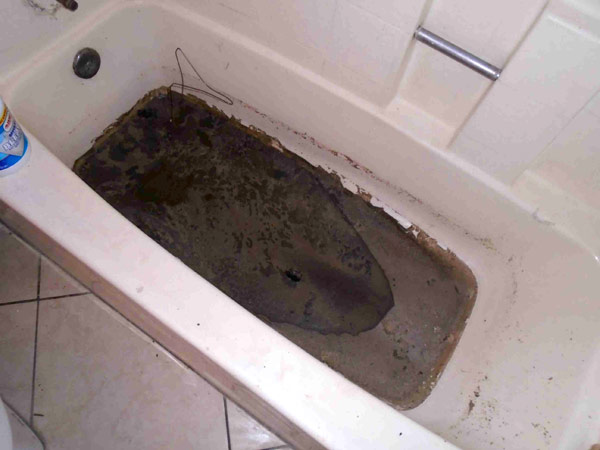Your Comprehensive Guide: Effluent Rising Through the Bathtub
Your Comprehensive Guide: Effluent Rising Through the Bathtub
Blog Article
We've noticed this article about What to Do if Sewage Starts Coming Up Through Your Bathtub directly below on the web and decided it made good sense to share it with you here.

Sewage backup in the tub can be a stressful and unhygienic issue for any home owner. Not just is it troublesome, yet it also positions severe health and wellness threats and shows underlying problems with the plumbing system. Understanding why sewage is turning up through the tub is vital for taking appropriate activity to deal with the problem successfully.
Introduction to the Problem
Typical Factors for Sewage Back-up
Obstructions in the Sewer Line
Among the most usual reasons for sewer backup is a blockage in the sewer line. This can occur due to the build-up of debris, grease, or international things in the pipelines, stopping correct flow and causing sewage to back up right into your bath tub.
Tree Origin Intrusion
Tree origins looking for moisture and nutrients can infiltrate sewage system lines with tiny splits or joints. Over time, these roots can expand and broaden, creating significant damage to the pipes and bring about sewage back-up issues.
Understanding the Issue
When sewage draws back up into the bathtub, it's a clear indication of an issue with the water drainage system. The wastewater that ought to be flowing far from your home is instead locating its way back right into your space, which can result in substantial damage and health hazards.
Potential Reasons
Several aspects can add to sewage backup in the bath tub. From clogs in the sewer line to issues with the plumbing facilities, recognizing the origin is vital for locating a solution.
Aging Framework
Older homes may have outdated plumbing systems that are extra prone to rust, fractures, and deterioration. As pipes age, they become more susceptible to leaks and blockages, increasing the likelihood of sewer back-up events.
Heavy Rainfall or Flooding
During periods of heavy rainfall or flooding, the sewer system may become overloaded with excess water, creating backups and overflows. This can result in sewage backing up right into tubs and other fixtures inside the home.
Indications of Sewage Backup
Foul Odors
Unpleasant smells originating from drains pipes or components, specifically in the restroom, might show sewage back-up concerns. These odors are commonly solid and relentless, signaling a problem that requires immediate interest.
Slow Draining Fixtures
Bathtubs, sinks, and bathrooms that drain pipes slowly or otherwise in all could be experiencing sewer backup. If several components are influenced simultaneously, it's most likely that the issue stems from a typical factor, such as the main sewer line.
Gurgling Noises
Odd gurgling or bubbling sounds originating from drains when water is running elsewhere in the house are indicative of air caught in the plumbing system. This air build-up can arise from sewer back-up and must be investigated without delay.
Health Dangers Connected With Sewer Backup
Contamination of Water Supply
Sewage backup can contaminate the supply of water in your house, posturing a serious health danger to you and your household. Direct exposure to infected water can bring about intestinal problems, skin infections, and various other illnesses.
Mold Development
Moisture from sewage backup can produce perfect conditions for mold development in your house. Mold spores can exacerbate respiratory system troubles and cause allergic reactions in delicate people, making timely clean-up vital.
Spread of Illness
Sewer has harmful bacteria, infections, and parasites that can trigger a range of conditions, consisting of liver disease, cholera, and gastroenteritis. Entering contact with sewage or contaminated surface areas puts you in jeopardy of infection.
Tidying up After Sewage Back-up
Sanitation Procedures
Thoroughly sanitize and sanitize influenced areas after sewer backup to eliminate unsafe bacteria and prevent mold development. Use proper cleansing items and safety gear to guarantee secure and reliable cleanup.
Repair of Influenced Locations
Repair any kind of damages to floor covering, walls, or components triggered by sewer backup. Relying on the extent of the damages, you might require to change carpeting, drywall, or various other products to recover your home to its pre-loss condition.
Immediate Actions to Take
Shutting Off Water System
In case of sewer backup, it's necessary to shut off the water system to avoid further contamination and damage. Situate the major water shutoff valve in your house and closed it off up until the concern can be resolved.
Contacting a Professional Plumber
Dealing with sewage back-up is not a do it yourself work. Contact a certified plumber with experience in managing sewage-related concerns to analyze the circumstance and carry out necessary repair work or cleanups.
Avoiding Contact with Polluted Water
Until the sewer back-up is solved, stay clear of contact with infected water to prevent the spread of bacteria and virus. Wear safety gear if you should be in the damaged area and wash your hands thoroughly afterward.
Safety nets
Routine Maintenance of Sewer Lines
Set up regular examinations and upkeep of your sewage system lines to determine and address prospective problems prior to they escalate right into significant troubles. This can include clearing out debris, inspecting for tree origin breach, and fixing any damaged pipes.
Mounting Bayou Valves
Take into consideration mounting backwater valves in your plumbing system to stop sewage from flowing back into your home throughout periods of heavy rainfall or flooding. These valves instantly close when water draws back up, safeguarding your property from contamination.
Appropriate Disposal of Family Waste
Avoid flushing anything besides toilet tissue and human waste down the commode to stop clogs and blockages in the sewage system line. Dispose of grease, oil, and other house chemicals effectively to reduce the danger of plumbing problems.
Why is There Sewage Coming Up Through the Bathtub
Sewage in your bathtub is a major problem that can make you want to abandon the bathroom for good. You don’t have to. However, it is important to identify the source of the issue and take the necessary steps to resolve it in order to avoid any health risks and property damage. In this article, we will discuss what could be causing sewage to back up through your bathtub so you can take action quickly and effectively.
The Main Reason For Sewage Backup in The Bathtub
All the sinks and toilets in your home connect to different pipes that lead to the main sewer line. The sewer line then connects to the municipal sewer system. This connection works seamlessly on a daily basis, but there can sometimes be a problem with the main sewer line.
The most common cause of sewage backup is a clogged or blocked main sewer line. The main sewer line can be clogged due to the accumulation of debris, tree roots or grease buildup, or other materials. Another possible cause is a collapsed pipe. When this happens, your toilets and sinks won’t be able to drain properly. This is when sewage starts backing up through the bathtub. If the problem has been occurring for some time now, it might be time to consult with a plumber as there may be more severe damage that needs fixing.
How Can You Tell if it’s Coming From Your Sewer Line?
If you’re experiencing a sewage backup in your bathtub, then you can use a few simple methods to determine if it is coming from the main sewer line. First, try to unclog the tub drain with a plunger or an auger and see if that helps. If not, then inspect all of the drains in your house and check if there is any blockage in them. If some of the other drains are not working fine, then it’s likely the problem is with your main sewer line.
Common Signs of a Clogged Main Sewer Line
If you suspect that your main sewer line is blocked, then there are a few common signs to look out for. Frequent clogs in your home are a sure sign of a clogged sewer line. You can also check for slow drainage from all the plumbing fixtures.
Slow Drains
If you notice that it takes longer for your sinks and toilets to drain, then this could be a sign of a clogged main sewer line.
Frequent Clogs
Another common sign is that your drains or toilets become clogged almost all of the time. If this happens, then it could be a sign that the main sewer line is blocked.
Water Backup
Do you notice water or sewage coming back up from any of the drains in your home? If your answer is yes, you may have a clogged main sewer line.
Sinkholes
If you’ve noticed sinkholes in your yard or overflowing sewage from the ground, you may be facing a blocked sewer line issue.
Your Shower or Sink Makes Gurgling Noises
Have you noticed gurgling noises coming from your sink or shower lately? These are typically signs of a blocked sewer line and should be checked out immediately.
How to Prevent a Main Sewer Line Clog
Once you’ve identified that your main sewer line is clogged, it’s important to take steps to prevent it from happening again. The best way to do this is to avoid putting any solid material that can clog the drain, such as grease and other debris. You should also be mindful of what you flush down your toilet. In addition, you should schedule regular maintenance for your main sewer line. This will help keep it clear and free from clogs or backups.
What Should You do if You Notice Sewage Backing up Through The Bathtub?
If you’ve noticed sewage backing up through the bathtub, then it is important to call a professional plumber immediately. A plumber can inspect the situation and determine what the cause is, such as a blocked main sewer line. They will also be able to advise you on how best to fix the issue. In some cases, a simple drain cleaning may be all that is needed.
However, if the blockage is severe, then your plumber may need to use more advanced methods to clear the blockage.
No matter what, it is important to always call a professional plumber if you experience any kind of sewage backup. They will be able to assess the situation and provide you with a solution that is best for your home.
https://baylorinc.com/blog/why-is-there-sewage-coming-up-through-the-bathtub/

I'm certainly very interested in Why is There Sewage Coming Up Through the Bathtub and I am praying you enjoyed reading the entire post. For those who appreciated our post kindly make sure you remember to pass it around. We enjoy reading our article about Water Coming up Bathtub Drain.
Book Services
Report this page